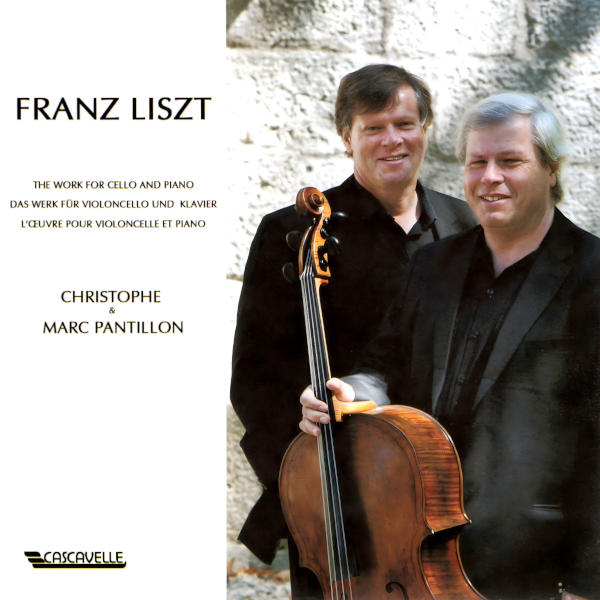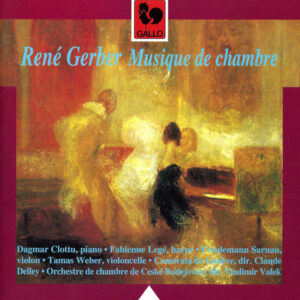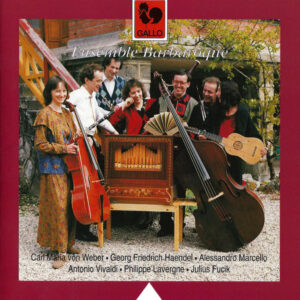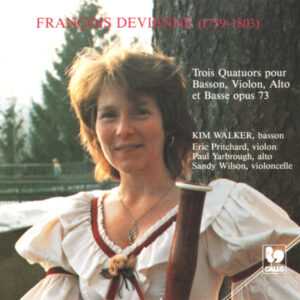Extraits / Excerpts
Liszt: The Work for Cello and Piano - Christophe Pantillon, Cello - Marc Pantillon, Piano
Franz LISZT: La lugubre gondola, S. 134 – 6 Consolations, S. 172: No. 1 in E Major (Transp. in C Major) – 6 Consolations, S. 172: No. 4 in D-Flat Major – 6 Consolations, S. 172: No. 2 in E Major (Transp. in A Major) – 6 Consolations, S. 172: No. 3 in D-Flat Major (Transp. in E Major) – 6 Consolations, S. 172: No. 5 in E Major (Transp. in G Major) – 6 Consolations, S. 172: No. 6 in E Major (Transp. in C Major) – Elégie No. 1, S. 130 – Elégie No. 2, S. 131 – Romance oubliée, S. 132 – Valses oubliées, S. 215: No. 1 in F-Sharp Major – Die Zelle in Nonnenwerth, S. 382 – Années de pèlerinage, 3ème année, S. 163: I. Angelus! Prière aux Anges Gardiens.
Christophe Pantillon, Cello – Marc Pantillon, Piano.
Christophe Pantillon plays Liszt
White hair flowing, he moved through the streets of Europe at a gallop. All the women swooned before his parchment color, his saturnine looks, and the virtuosity of his pianist hands. Armed with a first name that sounded like a gala evening, silks, knowing smiles, Liszt shone with a thousand lights: almost twenty years after Lady Liberty led the people of France and made the legs of the oppressed masses restless… how can one not launch into an adventure? From that comes the image of a superficial extrovert, only mobilized by the desire to surprise, the opposite of a Chopin, of a Schumann and some others. But nothing should be included with his soul to limit Liszt to his audacities, to his telluric excesses.
In many respects, Franz Liszt turned upside down the art of writing for the piano. This is due in great part, let us not forget it, to the technical inventions of Erard and Pleyel, who made possible what could not have even been imagined a few years earlier. But the maestro not only concentrated on his personal revolution. And this is what, today, is finally recognized.
The cellist, Christophe Pantillon, is the fourth generation of a very famous family of Swiss musicians, a dynasty that includes pianists and organists, as well as violinists of course. He was, for many years, the solo cellist of the Orchestre du Wienervolksoper of Vienna and his wife, Klara Fliedler, is a violinist and professor at the University Mozarteum of Salzburg.
He devotes a large part of his activity to the music of the twentieth century — both Schoenberg or Korngold — whose chamber music he likes to make known. Accompanied on the piano by his brother Marc, who also studied music in Vienna before returning to Switzerland, Christophe Pantillon offers an anthology both sensitive and singular of the works of Liszt for cello and piano.[show_more more=”Show More” less=”Show Less”]
« I have always been interested in Liszt », he admits. « Over time, I realized that this composer was even more eclectic than most people believed. » After having discovered a cello version of the “Lugubre Gondola”, Christophe Pantillon became familiar with other works. « I am struck by the considerable number of scores composed by Liszt », he says « and I often ask myself how just one man could find the time to create so many works? » Protean, Liszt was not content to be what could have been called a brilliant jack-of-all-trades.
His inner nature, the sincerity of his feelings led him to follow a path of faith. « His virtuoso side did not appear in the “Valse Oubliée” », notes Christophe Pantillon for example. « It is the religious man, the slightly somber mystic who expresses himself. And it was this man that I wanted to render homage to, because it is he that I admire above all. » So it should not be surprising that some pieces drawn from “Années de pèlerinage”, mysterious windows opening onto a secret universe, slip naturally into this anthology.
This disc makes the cello seem like a singing instrument, messenger of a story of which the piano seems to be the setting. « The scores that Liszt composed for the cello do not take him into the avant-garde, like those he was able to create for the piano, the soloist emphasizes. But they are not necessarily love songs. They are, through their form, very original; almost non-conformist, on a harmonic plane. Listening to them, the music lover finds himself in unknown territory, going from a large lyrical flight of fancy to intimate recitals, to the point that he might believe that he is listening to a work by César Franck or Debussy. »
Lastly, this disc reveals that Franz Liszt was generous to his students or to the composers of his time. The Wagner tree must not hide the forest of the many young people that Liszt supported: It is probably to one of them that he entrusted the transcription for cello of the “Vallée d’Obermann”. « He was very open to the new trends », delights Christophe Pantillon. « A little while after having been, without any doubt, a young wolf eager to succeed, Franz Liszt became aware that it had come true. Then he gave a lot. »
It is this blend of tenderness and meditation that does not fail to move us here. Like a boat between two ages, the music of Liszt moves away from Romanticism and creates the idea of a new world.
Frédérick Casadesus
[/show_more]
- Categories
- Composers
- Interprets
- Booklet












